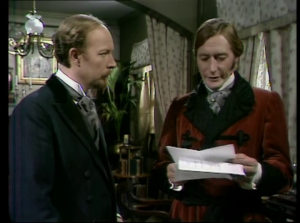It’s high time I did another “blind person in jeopardy” post, I was just thinking, so here we go.
The Rivals of Sherlock Holmes was an ITV series of 1971-2 based around the idea that Victorian London was swarming with sleuths, and maybe some of them were interesting enough to warrant televisual treatment of their own. The show ran for two series, with an amazing roster of guest stars impersonating the forgotten flatfoots (flatfeet?), but as to whether any of them really deserve to be called “rivals” of the Baker Street genius, one would have to fall back on the old Scottish verdict of “not proven.”

In The Case of the Mirror of Portugal, Peter Vaughn Vaughan plays Arthur Morrison’s shady private eye Horace Dorrington, a shameless crook who defrauds his customers, his only saving grace being that he gives the money to charity. Or so we’re supposed to believe. Vaughan is always good at playing menace, fake bonhomie and overbearing ebullience shading into aggression, and these qualities combine with his threatening bulk to rob the character of any lightness he might have had. He quips archly with clients about the deaths of family members, though this is meant to be excused by the customers being foreign and therefore devoid of true family feeling; he’s also a merciless taskmaster with his quavering staff (Kenneth Colley and Petronella Barker). Of course, Holmes was lacking in some of the social graces, but he stood for something, damnit. Reason, possibly.
The episode does feature a touchingly young Jeremy Irons and a heartbreakingly alive Paul Eddington.

James Cossins (left) and John Neville.
A Message from the Deep Sea stars John Neville, Baron Munchausen himself, as Dr Thorndyke — no relation to Mel Brooks’ headshrinker in HIGH ANXIETY, but certainly a close relative of Edinburgh physician Dr Joseph Bell, who inspired Sherlock Holmes in the first place. He’s another arrogant dick, but thanks to Neville’s elegant playing the show’s final scene turns on a dime from plea for preserving the sanctity of the crime scene, to something rather poetic and mysterious. Neville’s dreamy quality must be what commended him to Gilliam.

And so to Max Carrados, Ernest Bramah’s blind detective, essayed by Robert Stephens with plummy relish in The Case of the Missing Witness, just after he took the role of Holmes himself (played with a touch of Oscar Wilde) in THE PRIVATE LIFE OF SHERLOCK HOLMES — my favourite Holmes movie. I didn’t think this story made the best use of a blind detective — Fred Zinnemann’s EYES IN THE NIGHT has a good handle on the idea, and I also enjoyed Dario Argento’s CAT O NINE TAILS for its investigations by Karl Malden. Carrados is smart, but this particular plot depends on him happening to meet a key witness at just the time he’s establishing a false alibi for a Fenian terrorist, so the heavy hand of coincidence rather spoils my engagement in Carrados and his brilliance. In fact, I don’t even require him to be brilliant — I would love to see a blind detective based on Mr. Muckle in IT’S A GIFT, rampaging around the crime scenes smashing everything in (everybody else’s) sight, while Dr Thorndyke looks on aghast. Why has no commissioning editor put this on air, starring Robson Green? Since all the other Holmes rivals are a bunch of horrible swine, why not the one who at least has a disability in mitigation? Probably people will still feel sorry for him so he might as well flail about violently and smack them in the face.




